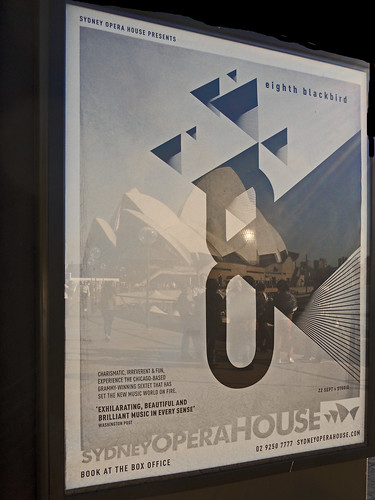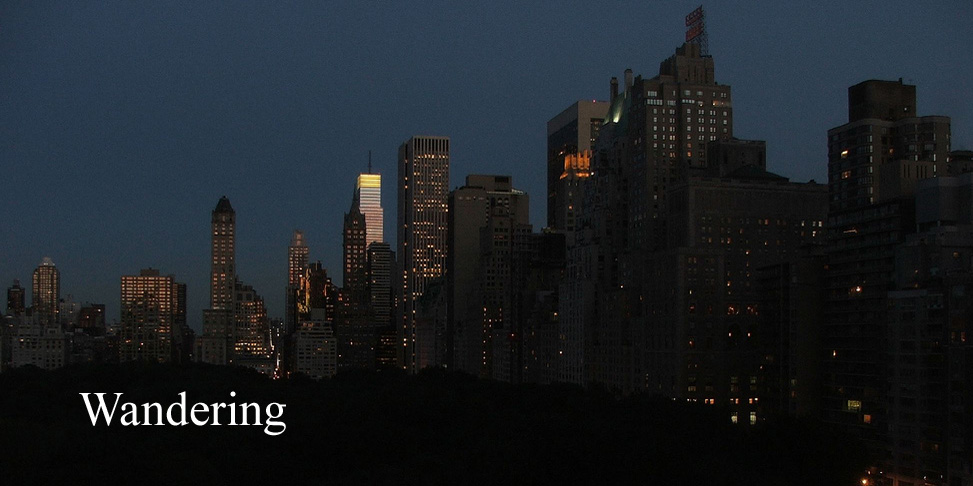
When I travelled to Bexhill-on-Sea in May to see eighth blackbird perform I didn't know they were going to alight much closer to home. On 22 September they gave a concert in The Studio at the Sydney Opera House.
I have been thinking about how much of the enjoyment of music is confined to the performance itself. When I hear new music, or music that is new to me, I am unable to take as much of it as I would like away. If I hear something I like, I want to hear it again but this is not always possible; and there is so much to hear ( and such little time ) that music that which makes a bad impression, or none, on a first hearing is lost forever. And when I hear something I like it is sometimes difficult to find a CD or other recording and again the memory fades. I found an echo of this thought in Wallace Stevens' fifth blackbird:
V
I do not know which to prefer,
The beauty of inflections
Or the beauty of innuendoes,
The blackbird whistling
Or just after.
Since I encountered them at the seaside, eighth blackbird has made the second change in its membership since it was founded in 1916: Yvonne Lam has replaced Matt Albert on violin and viola.
Their Sydney program included two of the pieces I heard them play earlier and four which were new to me.
Swedish composer Fabian Svensson, who was born in 1980, wrote his Two Sides for piccolo, bass clarinet, vibraphone, piano, violin, cello in 2007 for the Italian ensemble Sentieri selvaggi. It was to be played at a concert with the theme “the right to dissent”. He says:
Deeming it impossible to write a piece about as abstract a concept as that of the right to something, I decided instead to portray the actual concept of dissent. This was done by dividing the ensemble into two halves, one playing only in the high register, and the other only in the low register. These two groups are pitted against each other in an antagonistic and confrontational manner.
As performed by eighth blackbird, this involved the two groups of players entering from opposite sides of the room and facing each other as they played. At the end the players left one by one as they finished their parts leaving only two for the final confrontation. This was a lively and enjoyable piece. An excerpt from it,played by Sentieri selvaggi, is available on the composer's website.
Next came Mayke Nas: DiGiT #2 (written in 2002 ) for piano four hands, or so the program said. Much of it was for four forearms with the addition of rhythmic clapping. You might describe it as the obverse of John Cage's 4' 33". The avant guard is still around.
Next came Mayke Nas: DiGiT #2 (written in 2002 ) for piano four hands, or so the program said. Much of it was for four forearms with the addition of rhythmic clapping. You might describe it as the obverse of John Cage's 4' 33". The avant guard is still around.
Mayke Nas was born in the Netherlands in 1972. Her works include: I Delayed People's Flights By Walking Slowly In Narrow Hallways ( 2005 ) and Anyone can do it (2006) for six completely unprepaired players, not necessarily gifted with any musical talent". The avant guard is still around.
It's easy to be dismissive about self consciously modern performance works, and I won't miss not having a CD of DiGiT #2 ; but it was worth hearing and seeing it played with amazing musical and balletic skill by Lisa Kaplan and Matthew Duvall.
Phillip Glass wrote In Similar Motion in 1969, and it's one of the pieces I heard eighth blackbird play in May. Then I was impressed by the repetitions and other minimalist gestures in this music from the beginning of his career. This time I heard a lot more warmth and colour in the music. I wondered if the change in the venue was part of the reason. I think both the hall and the performance space were smaller in Sydney and there was a much larger audience in that space.
Timothy Andres, the youngest composer represented in the program, was born in 1985 in California. We heard his Crashing Through Fences (2009) written for piccolo, glockenspiel and two kickdrums. (The kickdrums are attached to the piccolo and glockenspiel players.) The composer says:
I was interested in creating a contrast between these innately unfeasible timbres and a long melody, unspooling over a sweet harmonic sequence .It’s an almost uncomfortably intimate sort of piece—the two instruments interact hesitantly at first, then with increasing boldness. And at opportune moments, they savagely kick each other.
I'm not sure what he means by "innately unfeasible", as the two instruments make a unique and very beautiful sound. The explosive interruptions by the kickdrums are arresting, but the thought crossed my mind that it would have been nice to hear the piece without the savage kicks. Fortunately a recording of Crashing ( played by Ian Rosenbaum, glockenspiel & kickdrum; Mindy Heinsohn, piccolo & kickdrum ) can be heard on the composers website.
Stephen Hartke’s Meanwhile: incidental music to imaginary puppet plays, (2007) concluded the program. I was fascinated by this music when I first heard it at Bexhill in May and excited to be able to hear it again. As far as I know, it's not available on CD, though many of Stephen Hartke's music is, and I hope to explore it. I previously mentioned that the members of eighth blackbird play this piece from memory and that it has been choreographed, so that they move about the space and form groups temporary ensembles as they play. As with the piece by Philip Glass, the performance didn't match my recollection of the earlier one. Everything seemed closer together in The Studio; and the sound more cohesive. Or was it my memory?
eighth blackbird at The Studio Sydney Opera House 22 September 2011.
eighth blackbird at The Studio Sydney Opera House 22 September 2011.





No comments:
Post a Comment